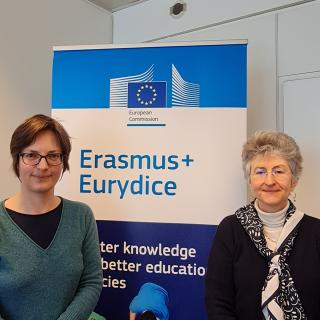Language Learning and Mobility: An interview with our authors

Nathalie Baidak and Anna Horvath are both analysts working in the Unit for Platform, Studies and Analysis at the Executive Agency for Education and Culture of the European Commission (EACEA). They have respectively worked on the Key Data on teaching languages in Europe 2023 report and the Mobility Scoreboard 2022/23 background report, both recent Eurydice publications.
Transnational mobility during education and training can be an important boost to the personal and professional development of students. Would you say that it has become easier for Europeans to move abroad during their studies?
Indeed, available statistics show the continuous expansion of learning mobility in Europe. Through the Erasmus+ programme, increasing resources are devoted to boosting learning mobility at the European level. Many European education systems are also working on facilitating cross-border mobility, especially in higher education, through providing financial support or by adapting their legislative frameworks to ease the recognition of learning outcomes or qualifications earned abroad.
However, obstacles to learning mobility remain. Comprehensive policy changes have been rare in Europe since the Mobility Scoreboard started monitoring national policies. Disadvantaged learners – students from low socio-economic backgrounds or with disabilities – are still significantly under-represented among mobile learners. Within the Mobility Scoreboard, the indicator on supporting the participation of disadvantaged learners reveals the greatest need for progress in European countries. Several national strategic frameworks aiming to increase the mobility participation of disadvantaged learners have expired and have not been renewed in recent years. So there is still a long way to go before learning mobility can become a reality for most European students.
Two main policy objectives in the field of the teaching and learning foreign languages are lowering the age at which children are taught a new language and helping young people learn two languages in addition to that of schooling. How would you evaluate the developments made by European education systems in this respect?
The Eurydice network has been collecting data in these areas for many years.
With respect to the early teaching of foreign languages, we observe a clear trend in Europe towards the teaching of the first foreign language at an early age. In 2002/2003, in most education systems, students started learning foreign languages at the age of 9 or later, while in only a third of them was the starting age earlier (between 6 and 8 years old in most cases). In contrast, in 2021/2022, in most education systems, students started learning a foreign language between 6- and 8-years old; in less than a fifth of education systems was foreign language learning starting at the age of 9 years or later.
With respect to the learning of two foreign languages, the picture is clearly more disappointing. Available Eurostat statistics show that in 2020, at EU level, 59.2% of students in lower secondary education were learning two or more foreign languages. This statistic has not changed much as in 2013, it was 58.4%.
Which (groups of) students do you think are being left with a disadvantage when it comes to both mobility and language teaching?
With the general improvement of foreign language teaching in European countries, not speaking foreign languages is less and less an obstacle to learning mobility. Nevertheless, in the Eurostudent survey, a higher proportion of students from a lower socio-economic background (with parents not having tertiary qualifications) mention the lack of sufficient language skills as an obstacle to learning mobility than their peers with more highly educated parents. Thus students who are already at a disadvantage may also have more difficulties in acquiring the necessary language skills to go abroad.
According to Eurostat statistics, students in vocational education and training (VET) learn fewer foreign languages than their counterparts in general education. For instance, in 2020, 60% of students in general upper secondary education learnt at least two languages, while they were only 35.1% in vocation upper secondary education. Moreover, nearly one in five students (that is 18%) in vocational upper secondary education did not learn any foreign language while in general upper secondary education they were only 2.9%. These statistics mirror regulatory frameworks in many European education systems, which provide fewer opportunities to learn foreign languages to VET students compared to general education students.
Thinking about the past and the future, what are some key policy developments in the fields of language learning and mobility that are worth noting? Which areas will require most attention in the coming years?
Lengthening compulsory language learning in school education is definitely a positive development that is also facilitating learning mobility in higher education.
In nearly all education systems, lengthening compulsory language learning meant introducing this learning at an earlier age. The number of years (and hours) spent on foreign language learning is clearly an important factor affecting students’ proficiency level. However, quality related factors such as the use of teaching methods appropriate to students ’age, teachers’ high level of competences in the foreign language they teach and how to teach them are also crucial for effective foreign language learning.
However, facilitating learning mobility for under-represented groups of students would need much greater policy focus in order to achieve good results. Education systems will need to make specific, targeted efforts to facilitate the mobility participation of these students. Currently, besides providing some form of targeted financial support, there is a general lack of systematic attention to supporting disadvantaged learners in most European countries.
To start with, only seven education systems have a comprehensive monitoring system which enables top-level authorities to collect information on the mobility participation of disadvantaged learners. Monitoring and data collection will therefore definitely need to be strengthened in the coming years. In addition, education systems could introduce strategic objectives related to diversity and the inclusiveness of learning mobility programmes. Some systems already instruct higher education institutions to give priority to under-represented groups of students in mobility programmes, have established targets or quotas, or fund information campaigns. These are also linked to an increasing focus on social inclusion in relation to learning mobility at the European level. So, setting such strategic priorities and targeted action could be a way forward. In addition, facilitating learning mobility in sectors other than higher education could also make the mobility experience a reality for more young people across Europe.




